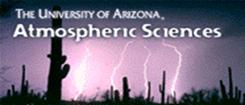

|
Class Hours and Location: 2:00 PM - 2:50 AM (MWF) in PAS 488 Instructor: Prof. Christopher L. Castro (email: castro@atmo.arizona.edu), PAS 520, 626-5617. Office Hours: Prof. Castro: MW 3:00-4:00 pm, but subject to change with advance notice, or by appointment
Required Texts and Notes:
Statistical Methods in the Atmospheric Sciences, Second Ed., by D. Wilks, 2006. Acadamic Press. 627 pp.
On-line notes from Professors Dennis Hartmann and John M. Wallace, Dept. of Atmospheric Sciences, University of Washington.
http://www.atmos.washington.edu/~dennis/552_Notes_ftp.html
My thanks to Professor Hartmann for permission to use these notes.
Supplemental Text:
Statistical Analysis in Climate Research, by H. von Storch and F.W. Zwiers, 1999. Cambridge. 484 pp.
Objective: This course provides an overview of statistical methods used to interpret datasets in the atmospheric and related sciences. It is a modified version of a statistical analysis course in the atmospheric sciences originally developed at the University of Washington by Professors Dennis Hartmann and John Wallace and currently taught at Colorado State University by Professor David W.J. Thompson. The course is designed as a tools class. The objective is to provide a working knowledge of the statistical tools most commonly used in the literature. Emphasis is placed on the application of tools discussed in class to analysis of datasets in the atmospheric and related sciences. Topics include application of basic statistics (composite analysis; significance testing; curve fitting; regression analysis; correlation; and non-normal distributions), non-parametric statistical significance testing (e.g. Monte-Carlo methods and field significance), matrix methods (principal component analysis; SVD analysis; CCA), and time series analysis (harmonic analysis; power spectra; data filtering; cross-spectrum analysis; singular spectrum analysis; and wavelet analysis).
Course outline:
1. Review and application of elementary statistics
Review of basic statistics Correlation theory, regression, multiple-regression, sampling theory of correlation Composite analysis Application of basic statistics to datasets Statistical treatment of non-normal distributions (e.g. SPI) Non-parametric statistical significance testing
2. Matrix methods
Review of linear algebra, vector spaces, rank, orthogonalization Matrix decomposition, singular value decomposition (SVD) Application of SVD to empirical orthogonal function, principal component analysis SVD analysis Rotated EOF analysis Canonical Correlation Analysis POP Analysis
3. Time series analysis
Autocorrelation; red noise and white noise Harmonic analysis, power spectra, methods of computing power spectra Significance of spectral peaks and data windows Cross spectrum analysis Filtering Singular spectrum analysis MTM-SVD Analysis
Grading: 70% of the grade is based on seven homework assignments which emphasize the application of tools discussed in class to observed data. The remaining 30% of the grade is based on a student term project. Term project proposal will be due approximately midway through the semester, and term projects will be due by the last class of the semester. Project write-ups will be as articles written in AGU/AMS format and should include an introduction, methodological description, presentation of results, discussion, summary, and figures. Students will also present their results in the form of a 10 to 15 minute oral presentation during approximately the last one to two weeks of the course, depending on course enrollment. There are no examinations.
Course prerequisites:
College-level statistics course Linear algebra
Course will also require familiarity with computing programming and computer graphical display packages (e.g. GrADS, IDL, Matlab). Prerequisites may be waived with permission of instructor.
Attendance Policy: All holidays or special events observed by organized religions will be honored for those students who show affiliation with that particular religion if the instructor is given reasonable notice. Absences for travel and university activities will be honored if the instructor is given reasonable advance notice. Students are responsible for all material missed in class. Academic Integrity: The UA Code of Academic Integrity, Code of Conduct and Student Code of Conduct are strictly followed. All students are responsible for knowing the codes and abiding by them. See http://web.arizona.edu/~dos/uapolicies/. You can submit complaints about fellow students online at http://dos.web.arizona.edu/uapolicies/index.html. Your submission is completely anonymous, and I will investigate the allegations further. Disability Resource Center: I remind students who are registered with the Disability Resource Center that I must receive appropriate documentation if they are requesting reasonable accommodations.
Course Withdrawal: Last day to drop the course without it appearing on your record is Friday Sep. 14, 2007. Last day to drop the course with a "W'' grade is Friday Oct. 12, 2007. To receive a W, your average grade at the time you drop must equal or exceed 55%. |
|
Syllabus |
|
Objective Analysis in the Atmospheric and Related Sciences |
|
MWF 2:00 P.M.—2:50 A.M. PAS 488 |


|
Objective Analysis in the Atmospheric and Related Sciences Fall Semester 2007 |
|
MWF 2:00 P.M.—2:50 P.M. PAS 488 |
